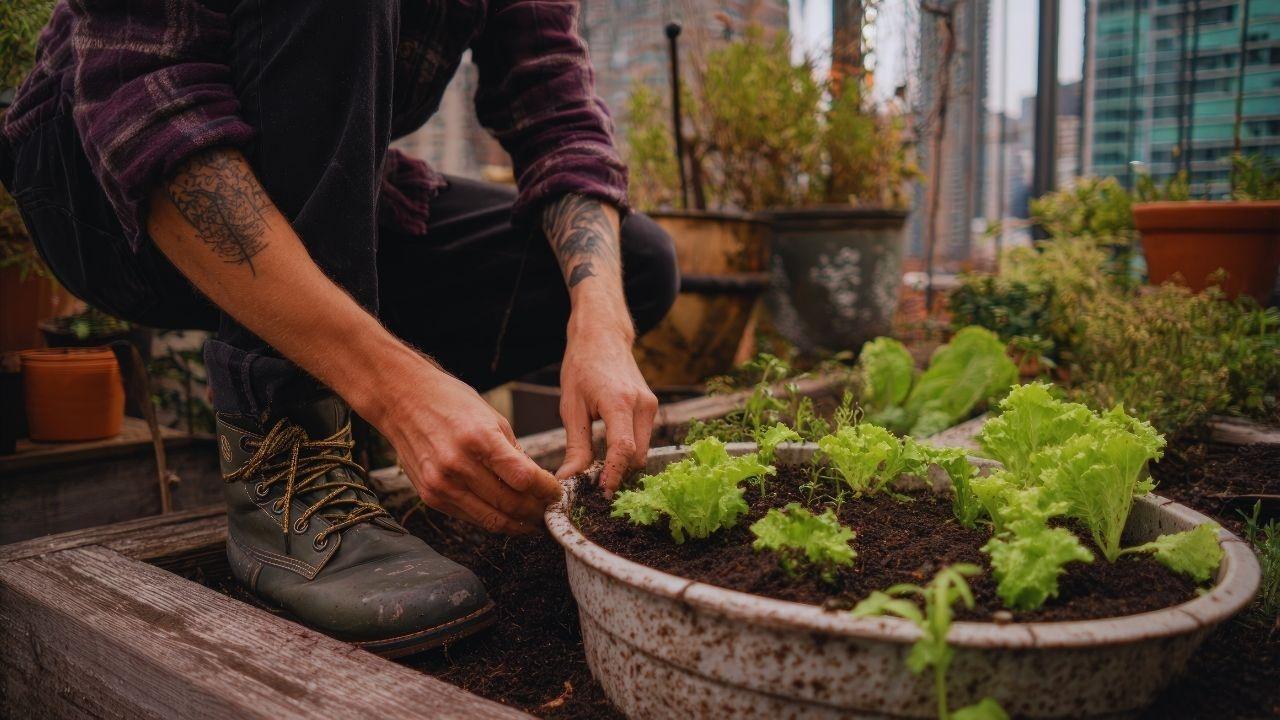
Post by : Anees Nasser
Across many metropolitan centres, a subtle transformation is underway — an urban gardening revival that is reclaiming balconies, rooftops and compact interiors as sites for food production and nature. What began as a coping mechanism during lockdowns has matured into a durable practice reflecting new urban priorities.
From New York and London to Mumbai, Dubai and Singapore, residents are introducing herbs, vegetables and compact farms into formerly grey spaces. Window boxes, balcony trellises and indoor hydroponic units are now common, signalling a shift toward living that is simultaneously resource-conscious, design-aware and life-enhancing.
The pandemic accelerated interest in home-grown produce as people sought control over food and personal wellbeing. What started as a temporary pastime for many has persisted, driven by the tangible rewards of nurturing living systems and the desire for practical self-reliance.
Today the practice continues not merely as decoration but as a meaningful routine that addresses emotional and ecological needs in densely populated environments.
Several intersecting trends underpin the sector’s expansion:
Stronger sustainability agendas: Awareness of climate impacts and food-system vulnerabilities is motivating urban residents to produce food locally and reduce supply-chain dependency.
Holistic wellbeing: Interaction with plants is now recognised for measurable mental-health benefits, from lowered stress to improved mood.
Tech-enabled cultivation: Smart planters, app-managed hydroponic units and automated watering systems lower the skill threshold for indoor farming.
Economic pressures: Inflation and intermittent supply disruptions make home-grown herbs and vegetables an attractive way to reduce household food costs.
Design and lifestyle influence: Social platforms have popularised aesthetically curated green corners, turning small-scale cultivation into a visible lifestyle choice.
Contemporary urban gardening no longer presumes access to soil or expansive plots. Vertical systems, stacked hydroponics and modular container setups are enabling high yields from very limited footprints.
Homeowners and renters alike are deploying hanging planters, wall-mounted arrays and recycled containers to maximise light and airflow. The practical message is clear: productive gardens are feasible without traditional land.
Advances in soilless cultivation and sensor-driven devices have made indoor farming more predictable. Hydroponic systems allow vegetables to be grown in water with nutrient solutions, removing the need for large soil beds.
Connected planters now report humidity, nutrient concentration and light exposure to users’ phones; some platforms use AI to schedule irrigation and lighting. This convergence of ecology and engineering underpins what is increasingly referred to as the smart garden movement.
Apartment-based hydroponic setups — once experimental — are becoming routine in cities such as Dubai, Seoul and Singapore.
Tending plants in an urban setting provides focused, low-tech engagement that counters constant digital stimulation. Gardening cultivates patience and observation while delivering concrete results, which many residents find grounding.
Mental-health professionals note that these activities foster mindfulness and resilience. As one planter in Mumbai observed, "My balcony garden is where daily pressure eases and routines feel tangible again."
Beyond private balconies, cities are seeing collaborative green projects. Community gardens and rooftop farms convert underused spaces into shared food-producing areas that strengthen neighbourhood ties and improve local environments.
Municipal authorities in several Western and Asian cities are supporting these initiatives through grants, access to land and policy incentives, recognising their benefits for social cohesion and urban cooling.
The rise of microgreens exemplifies the compact cultivation trend. These fast-growing, nutrient-dense shoots can be harvested within days and require negligible space — ideal for apartment kitchens.
Combined with indoor compost solutions, microgreen crops form part of circular home food systems that reduce waste and improve food security.
Biophilic design—integrating living systems into the built environment—has shifted from novelty to mainstream. Developers increasingly specify green facades, shared terraces and integrated planting systems as part of residential and commercial projects.
Examples include vertical plantings on high-rises and rooftop food gardens in mixed-use developments, reflecting a view that green infrastructure supports both wellbeing and climate adaptation.
Urban cultivation faces limitations: restricted sunlight, pollution, water access and building rules. Yet practical responses are emerging — from drought-tolerant species and lightweight substrates to self-watering containers and shade-adapted designs.
Public and private programmes that offer training and subsidies are further lowering barriers for would-be urban growers.
The cumulative effects of individual gardens are notable:
Lower emissions: Local production reduces transport and packaging-related carbon outputs.
Better air quality: Vegetation helps filter pollutants and can improve neighbourhood air.
Cooling benefits: Green roofs and terraces mitigate urban heat island impacts.
Waste diversion: Home composting reduces organic refuse bound for landfill.
Incremental adoption across many households contributes to more liveable and resilient cities.
Online platforms have accelerated adoption by sharing practical techniques, design inspiration and community stories. Hashtags and influencer content have reframed gardening as an accessible, modern pursuit for younger urbanites.
As a result, horticulture is shedding age-based stereotypes and emerging as a mainstream urban practice.
Urban gardening supports local resilience and micro-enterprises. Surplus produce sometimes enters neighbourhood markets, and small urban farms create jobs and training opportunities. Educational programmes in schools use rooftop gardens to teach ecology and nutrition.
Practical entry points include:
Evaluate conditions: Note sunlight, wind and available footprint.
Choose manageable crops: Start with herbs and salad greens.
Reuse containers: Employ jars, crates and pots to conserve resources.
Work vertically: Use wall-mounted planters and hanging baskets.
Conserve water: Adopt drip lines or self-watering systems.
Prefer organic methods: Compost and natural pest controls enhance sustainability.
Build routine: Consistent care yields better results than sporadic effort.
Small, deliberate steps can establish productive and low-maintenance urban plots.
Urban gardening increasingly reads as a component of resilient city planning — a way to integrate food production, wellbeing and climate adaptation inside dense settlements. Planting a balcony bed or converting a rooftop is both a personal choice and a public contribution to urban sustainability.
This piece provides editorial analysis and practical guidance on urban gardening trends. Readers should consult local regulations and expert sources when implementing cultivation projects.










BTS Tour Sparks Global Demand: Mexico Appeals for Additional Shows
BTS' comeback tour creates immense demand in Mexico, prompting President Sheinbaum to urge more conc

Former First Lady Exonerated Amidst Martial Law Controversies
The former First Lady was found not guilty on key charges, but prosecutors intend to appeal as inves

Kim Jong Un Aims to Enhance North Korea’s Nuclear Capabilities
Kim Jong Un is preparing to unveil significant enhancements in North Korea's nuclear and missile sys

Rybakina and Pegula Reach Australian Open Semifinals Following Major Upsets
Rybakina upsets Swiatek; Pegula defeats Anisimova. Both advance to the Australian Open semifinals, a

Trump Appeals for Calm After Federal Shooting Incident in Minnesota
In response to the fatal shooting of two citizens by federal agents, President Trump calls for calm

Malaysian Football Association's Executive Resigns Amid FIFA Sanctions
The Football Association of Malaysia's leadership resigns following FIFA sanctions related to player